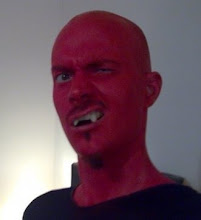Shutter Island
It’s hard not to go into Shutter Island without trepidation. This may be Scorsese, but this is Dicaprio-era Scorsese; again we see Leo’s constipated baby face, here in a period setting not far removed from the bloated The Aviator. The set itself is arguably a character, a brooding, menacing chunk of rock, the island mental institution is evocative of that certain period of American history, which in broad genre terms runs western-gangster-suburban. Shutter Island works in the post-war tension evident in the heavily-armed guards patrolling in army jeeps (we’re told that the island houses only the most dangerous patients) along with the fascination with psychoanalysis and the rise in power of the federal government leading to paranoia and conspiracy theories.
As with most Scorsese pictures the film features top notch support in the form of Ben Kingsley as the chief psychiatrist, Mark Ruffalo playing Leo’s partner and Max Von Sydow as a red herring.
The problem with films about mental institutions is that a realist view is banal, whilst the more juicy, comic visions become cartoonish and therefore are no longer about real people. As Shutter Island descends into the usual dank cell/horror mask cliches you would expect from Victorian mad houses the film loses its way. The twist (which will occur to the viewer within minutes if they’ve seen anything else about mental illness and identity), when it comes, is at odds with this. Trying to present the grotesque as realistic when relying on the skewed perception of the ill can paper a lot of cracks, the film’s twist is hardly less obvious for not choosing this route.
Leo is fine in the role of US Marshal Teddy Daniels investigating the disappearance of one of the patients, once again taking some flack for being Marty’s new muse but hardly responsible for the flaws in the film. In the hands of a journeyman director Shutter Island would be a solid, well-crafted if unremarkable thriller, but for Scorsese this simply isn’t enough. A study in the difficulty of overcoming grief and loss, the films ends up using this as an excuse for a gothic horror romp, a standard chiller with ‘ideas’ tacked on to it every now and then.
Not a return to form but a better offering than many of Scorsese’s recent pictures.


0 comments:
Post a Comment